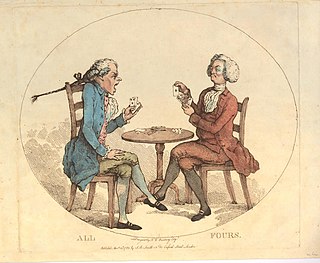
All fours is a traditional English card game, once popular in pubs and taverns as well as among the gentry, that flourished as a gambling game until the end of the 19th century. It is a trick-taking card game that was originally designed for two players, but developed variants for more players. According to Charles Cotton, the game originated in Kent, but spread to the whole of England and eventually abroad. It is the eponymous and earliest recorded game of a family that flourished most in 19th century North America and whose progeny include pitch, pedro and cinch, games that even competed with poker and euchre. Nowadays the original game is especially popular in Trinidad and Tobago, but regional variants have also survived in England. The game's "great mark of distinction" is that it gave the name 'jack' to the card previously known as the knave.

Forty-fives is a trick-taking card game that originated in Ireland. The game is popular in many communities throughout Atlantic Canada as well as the Gaspé Coast in Québec. Forty-fives is also played in parts of Massachusetts and southern New Hampshire in New England, United States, as well as in the South Island of New Zealand.

Ombre or l'Hombre is a fast-moving seventeenth-century trick-taking card game for three players and "the most successful card game ever invented."
Pedro is an American trick-taking card game of the all fours family based on auction pitch. Its most popular variant is known as cinch, double Pedro or high five which was developed in Denver, Colorado, around 1885 and soon regarded as the most important American member of the all fours family. Although it went out of fashion with the rise of auction bridge, it is still widely played on the western coast of the United States and in its southern states, being the dominant game in some locations in Louisiana. Forms of the game have been reported from Nicaragua, the Azores, Niobe NY, Italy, and Finland. The game is primarily played by four players in fixed partnerships, but can also be played by 2–6 individual players.

Bid whist is a partnership trick-taking variant of the classic card game whist. As indicated by the name, bid whist adds a bidding element to the game that is not present in classic whist. Bid whist, along with spades, remains popular particularly in U.S. military culture and a tradition in African-American culture.
Pitch is an American trick-taking game equivalent to the British blind all fours which, in turn, is derived from the classic all fours. Historically, pitch started as "blind all fours", a very simple all fours variant that is still played in England as a pub game. The modern game involving a bidding phase and setting back a party's score if the bid is not reached came up in the middle of the 19th century and is more precisely known as auction pitch or setback.

Twenty-five is the Irish national card game, which also underlies the Canadian game of Forty-fives. Charles Cotton describes its ancestor in 1674 as "Five Cards", and gives the nickname five fingers to the Five of Trumps extracted from the fact that the Irish word cúig means both 'five' and 'trick'. It is supposed to be of great antiquity, and widely believed to have originated in Ireland, although "its venerable ancestor", Maw, of which James I of England was very fond, is a Scottish game.
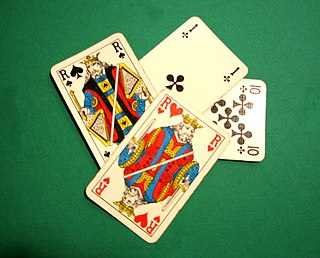
Clabber is a four-player card game played in southwestern Indiana near Evansville. It is a member of the Jack–nine family of point-trick card games that are popular in Europe and is similar to Klaberjass. The trump makers must score at least eighty-two points to keep from "going set", where they don't score any of their points. Additional points can also be scored for a combination of cards in a hand, which would assist in "making it", or, not going set.
Cinch, also known as Double Pedro or High Five, is an American trick-taking card game of the all fours family derived from Auction Pitch via Pedro. Developed in Denver, Colorado in the 1880s, it was soon regarded as the most important member of the all fours family in the USA, but went out of fashion with the rise of Auction Bridge. The game is primarily played by 4 players in fixed partnerships, but can also be played by 2–6 individual players.
Smear is a North-American trick-taking card game of the all fours group, and a variant of pitch (setback). Several slightly different versions are played in Michigan, Minnesota, Northern and Central Iowa, Wisconsin and also in Ontario, Canada.

The following is a glossary of terms used in card games. Besides the terms listed here, there are thousands of common and uncommon slang terms. Terms in this glossary should not be game-specific, but apply to a wide range of card games played with non-proprietary packs. It should not include terms solely related to casino or banking games. For glossaries that relate primarily to one game or family of similar games, see Game-specific glossaries.

Tippen, also known as Dreiblatt, Dreikart, Drei Karten, Dreekort, Kleinpréférence or Labet, is an historical German 3-card, plain-trick game which was popular as a gambling game for three or more players. The Danish version of the game was known as Trekort and more elaborate Swedish variants include Knack and Köpknack. It appears to be related to the English game of Three-Card Loo. It was banned as a gambling game in some places.
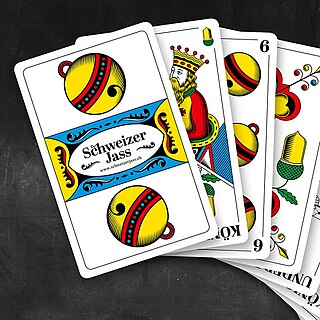
Chratze is a trick taking card game, mainly played in the German-speaking part of Switzerland as well as in Bavaria. It is one of over 70 variants of Jass and played with a pack of 36 cards, either a Swiss-German or French one. It appears to be related to the Austrian game, Kratzen.

Bestia is an Italian card game. It is a gambling game and is similar to Briscola and Tressette. The word bestia means beast.
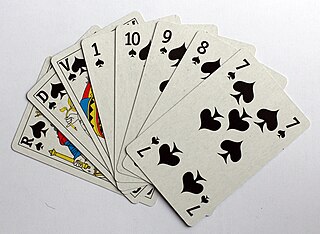
Triomphe, once known as French ruff, is a card game dating from the late 15th century. It most likely originated in France or Spain and later spread to the rest of Europe. When the game arrived in Italy, it shared a similar name with the pre-existing game and deck known as trionfi; probably resulting in the latter becoming renamed as Tarocchi (tarot). While trionfi has a fifth suit that acts as permanent trumps, triomphe randomly selects one of the existing four suits as trumps. Another common feature of this game is the robbing of the stock. Triomphe became so popular that during the 16th century the earlier game of trionfi was gradually renamed tarocchi, tarot, or tarock. This game is the origin of the English word "trump" and is the ancestor of many trick-taking games like Euchre and Whist. The earliest known description of Triomphe was of a point-trick game, perhaps one of the earliest of its type; later, the name was applied to a plain-trick game.
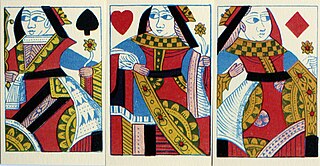
Gleek is an English card game for three people. It is played with a 44-card pack and was popular from the 16th century through the 18th century.
Lampeln or Lampln is an old Bavarian and Austrian plain-trick card game that is still played in a few places today. It is one of the Rams group of card games characterised by allowing players to drop out of the current game if they think they will be unable to win any tricks or a minimum number of tricks.
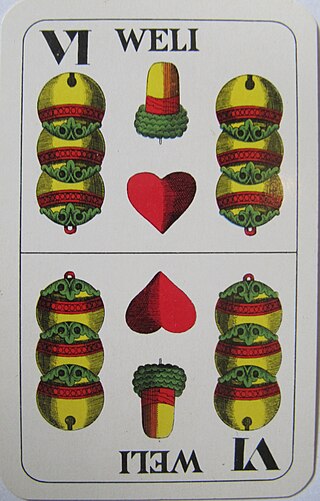
Kratzen is an Austrian card game for three to six players that is played for small stakes usually using a 33-card William Tell pack. It is a member of the Rams group of card games characterised by allowing players to drop out of the current game if they think they will be unable to win any tricks or a minimum number of tricks. The game is related to the Swiss Jass form, Chratze and has been described as "fun" to play.
Bester Bube, also Fiefkort mit 'n besten Buren, is an historical German card game for 3–6 players played with a Piquet pack. It is one of the Rams group of card games characterised by allowing players to drop out of the current game if they think they will be unable to win any tricks or a minimum number of tricks. It may be an ancestor of Five-Card Loo.

Bura is a Russian ace–ten card game that is "particularly characteristic of Russian prisoners and ex-prisoners. Its alternative name of thirty-one refers to the combination of three trump cards that wins the game. One of the main variants of this game is known as Kozel ("goat") or Bura Kozel. It is a point-trick game with the unusual feature that players may lead several cards of the same suit at once.














